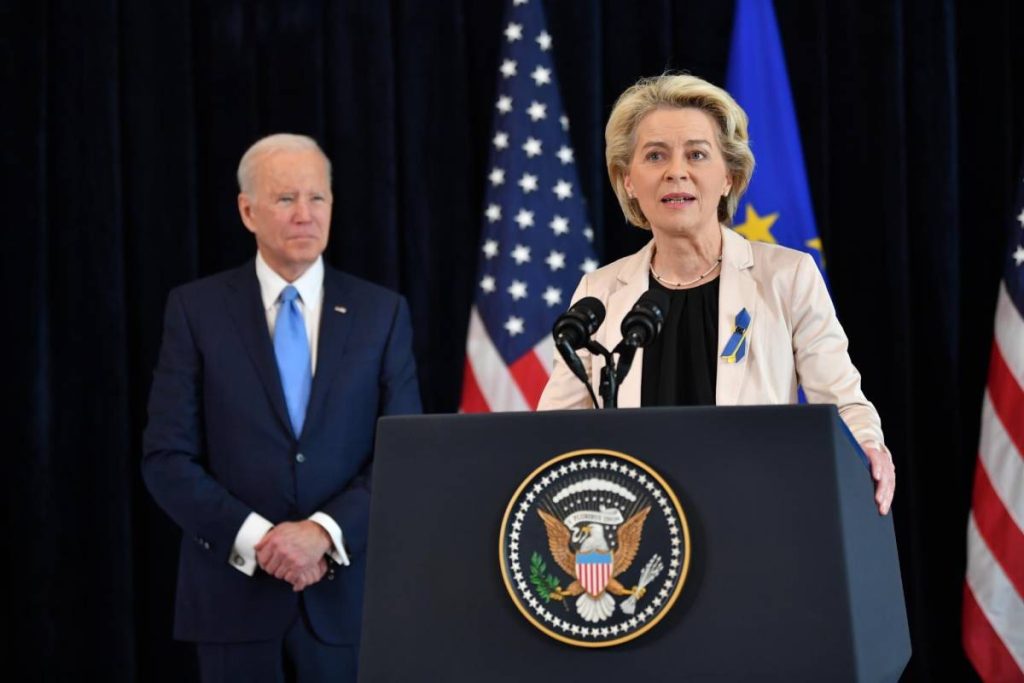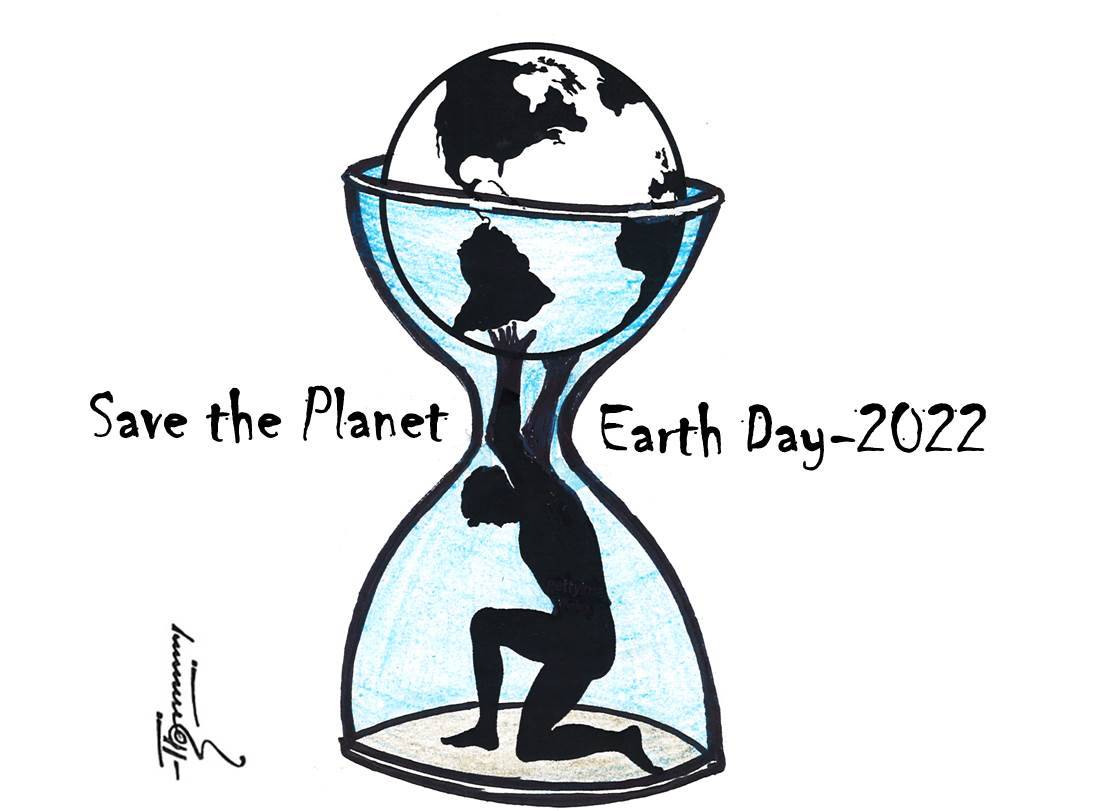Protests held in capitals across Europe and calls for end to Russian oil and gas imports
Climate change activists around the world staged a wave of protests for Earth Day, pushing demands such as an immediate halt to European imports of Russian oil and gas and an end to building fossil fuel infrastructure.
In Europe, activists in Berlin, Warsaw, Brussels and elsewhere held rallies outside German government and embassy buildings, where they handed out red-stained notes of Russia’s rouble currency to symbolise blood, saying Russian money was fuelling both climate change and the bloody invasion of Ukraine.
Germany is among several European Union countries that are opposed to a complete embargo on Russian oil and gas for fear of damage to their national economies.
About a dozen activists in the western Ukrainian city of Lviv – where Russian missiles killed seven people this week – also planned to take part in the Earth Day protest.
“When Germany continues buying gas and oil from Russia, it means that they are paying their money to construct new military machines, new bombs, which are killing Ukrainians,” Natalia Gozak, head of the EcoAction civil society group, said from Lviv.
Gozak said European politicians need to choose between the economic “inconveniences” of an embargo and the deaths of Ukrainian people.
In the United States, activists from the Extinction Rebellion group blockaded a New York newspaper printing facility and called for more media coverage of climate change issues.
Youth protesters also gathered in locations including the Thai capital, Bangkok, and Stockholm, where Swedish activist Greta Thunberg joined the school strike – a weekly protest she began as a solitary student in 2018 to highlight the need for urgent action to address climate change.
The Earth Day rallies come just weeks after a UN climate scientist report warned there is little time left to reduce greenhouse gas emissions sufficiently to prevent the worst impacts of a changing climate.
Earlier this week, a survey by Ipsos found that two-thirds of approximately 20,000 people queried in 31 countries said they were worried about a climate-altered future.
Europe under pressure
The EU receives 40 percent of its gas supply from Russia and since the February 24 invasion of Ukraine, the EU has spent more than 38 billion euros ($41.2bn) on Russian fossil fuel imports.
The bloc’s 27 countries have agreed to ban Russian coal imports from August, as part of sweeping sanctions also targeting Russian banks and business tycoons.
Countries including Italy and Germany have said they can wean themselves off Russian gas within a few years, and some European companies are already shunning Russian oil voluntarily to avoid reputational damage or possible legal troubles.

But the EU states are split over whether to impose an immediate and full embargo on Russian fuels, which Germany and Hungary say would hurt their economies.
The European Commission is assessing the costs of replacing Russian oil with imports from elsewhere, in an effort to persuade reluctant EU nations to accept an embargo, an EU source told Reuters this week.
Rather than organise massive street protests that drew hundreds of thousands in past years and helped draw international attention to climate change, Warsaw-based climate activist Dominika Lasota, 20, said the youth movement Fridays for Future would be changing its approach to protest by holding smaller actions targeting specific governments that are opposed to fossil fuel sanctions.
The group wants to highlight the role that fossil fuels are playing in funding the Ukraine conflict, she said.
“It’s wartime. We have to brace for a longer marathon,” Lasota said.
“The war will not stop with the last bomb that will fall … it will end once we end the [fossil fuel] industry and the system behind it.”
Ukrainian NGOs also planned to send a letter on Friday to Germany’s parliament demanding the country stop buying Russian oil and gas.
“Germany is one of its main consumers and thus is the main sponsor of war in Ukraine,” said the letter, seen by Reuters.
“You only need some political will and humaneness to impose a full embargo on Russian oil and gas.”
Biden sets tone
United States President Joe Biden on Thursday reclaimed global leadership on the climate crisis, kicking off the two-day virtual Earth Day Summit with a pledge to halve US emissions by the end of the decade.
“Time is short, but I believe we can do this,” Biden said in his opening remarks. “We will do this.”
The new US commitment, announced by the White House promises to slash the nation’s carbon emissions by at least 50 percent by 2030 based on 2005 levels.
The aggressive goal set the tone for a summit that gathers leaders from some 40 nations as the coronavirus pandemic rages on several continents along with economic uncertainty.
The purpose of the Earth Day gathering, US officials say, is to highlight the urgency of climate action and underscore the economic benefits to be reaped from investing in renewable energy as well as minimising the catastrophic impacts of global warming.
In addition to the US, officials from a handful of other major emitters are expected to announce new pledges on the road to COP26, the United Nations climate conference in Glasgow, Scotland, scheduled for November.
Following opening remarks by Biden and Vice-President Kamala Harris, UN Secretary-General Antonio Guterres started his address to the gathering by thanking the US for helping the world focus on the “existential threat” of climate change.
“Mother Nature is not waiting,” said Guterres, according to a prepared statement released in advance of his live remarks. “The past decade was the hottest on record. Dangerous greenhouse gases are at levels not seen in three million years.”
ALSO READ-MDX joins Light It Forward UAE to illuminate Dubai skyline on World Earth Day

